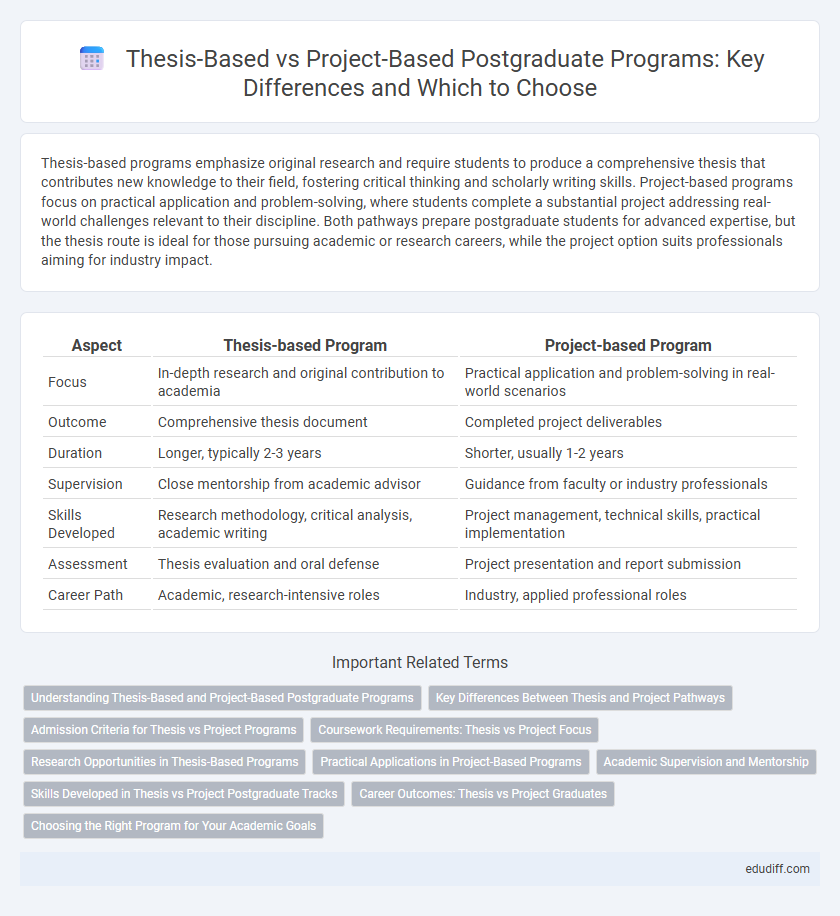Thesis-based programs emphasize original research and require students to produce a comprehensive thesis that contributes new knowledge to their field, fostering critical thinking and scholarly writing skills. Project-based programs focus on practical application and problem-solving, where students complete a substantial project addressing real-world challenges relevant to their discipline. Both pathways prepare postgraduate students for advanced expertise, but the thesis route is ideal for those pursuing academic or research careers, while the project option suits professionals aiming for industry impact.
Table of Comparison
| Aspect | Thesis-based Program | Project-based Program |
|---|---|---|
| Focus | In-depth research and original contribution to academia | Practical application and problem-solving in real-world scenarios |
| Outcome | Comprehensive thesis document | Completed project deliverables |
| Duration | Longer, typically 2-3 years | Shorter, usually 1-2 years |
| Supervision | Close mentorship from academic advisor | Guidance from faculty or industry professionals |
| Skills Developed | Research methodology, critical analysis, academic writing | Project management, technical skills, practical implementation |
| Assessment | Thesis evaluation and oral defense | Project presentation and report submission |
| Career Path | Academic, research-intensive roles | Industry, applied professional roles |
Understanding Thesis-Based and Project-Based Postgraduate Programs
Thesis-based postgraduate programs emphasize original research, requiring students to develop a comprehensive thesis that contributes new knowledge to their field, often favoring those pursuing academic or research careers. Project-based programs focus on practical application and problem-solving skills through the completion of a substantial project, making them suitable for professionals aiming to enhance industry-related expertise. Understanding the distinct learning outcomes and career pathways associated with each program type helps students align their postgraduate experience with their long-term goals.
Key Differences Between Thesis and Project Pathways
Thesis-based programs emphasize original research, requiring students to develop a comprehensive study, formulate hypotheses, and contribute new knowledge to their field, often culminating in a detailed written thesis. Project-based programs focus on practical application and problem-solving, encouraging students to implement existing theories into real-world projects, resulting in deliverables such as reports, prototypes, or software. The key difference lies in the thesis pathway prioritizing theoretical research and scholarly contribution, while the project pathway centers on applied skills and tangible outcomes.
Admission Criteria for Thesis vs Project Programs
Thesis-based postgraduate programs typically require candidates to demonstrate strong research capabilities through a detailed proposal and academic writing samples, with emphasis on previous research experience and high academic standings. Project-based programs prioritize practical skills and relevant professional experience, often requiring portfolios or documented project work alongside standard academic qualifications. Both pathways necessitate meeting minimum GPA thresholds, but thesis programs demand a greater emphasis on analytical and methodological rigor.
Coursework Requirements: Thesis vs Project Focus
Thesis-based programs typically require extensive research coursework emphasizing theoretical frameworks and methodological rigor, culminating in a substantial thesis that contributes original knowledge to the field. Project-based programs prioritize practical coursework oriented towards applied skills and professional practice, resulting in a project or portfolio that demonstrates real-world problem-solving abilities. Both pathways demand coursework aligned with their respective research or application focus, tailored to develop specialized expertise in postgraduate studies.
Research Opportunities in Thesis-Based Programs
Thesis-based programs offer extensive research opportunities by requiring students to conduct original investigations under faculty supervision, fostering critical thinking and expertise in specialized areas. These programs typically involve designing experiments, data analysis, and scholarly writing, which are essential for careers in academia and research-intensive industries. Access to advanced laboratories, research grants, and publication prospects further enhances the research experience in thesis-based postgraduate studies.
Practical Applications in Project-Based Programs
Project-based postgraduate programs emphasize hands-on practical applications by engaging students in real-world problem-solving, directly linking theory with practice. These programs often involve designing, implementing, and managing projects that reflect industry standards, enhancing skills such as critical thinking, project management, and teamwork. This approach contrasts with thesis-based programs, which primarily focus on in-depth research and theoretical contributions to academic knowledge.
Academic Supervision and Mentorship
Thesis-based programs provide intensive academic supervision through one-on-one mentorship, fostering deep research skills and critical analysis under expert guidance. Project-based programs emphasize practical application with regular mentorship focused on project management, problem-solving, and industry-relevant skills. Both formats require active engagement with supervisors to ensure academic rigor and professional development tailored to the student's goals.
Skills Developed in Thesis vs Project Postgraduate Tracks
Thesis-based postgraduate programs develop advanced research skills, critical thinking, and in-depth subject mastery through extensive literature review and original investigation. Project-based programs emphasize practical application, problem-solving abilities, project management, and teamwork by focusing on real-world challenges and deliverables. Both tracks cultivate analytical proficiency but differ in fostering theoretical insight versus hands-on experience.
Career Outcomes: Thesis vs Project Graduates
Thesis-based postgraduate programs emphasize research skills, preparing graduates for academic, scientific, and research-intensive careers, often leading to doctoral studies or roles in innovation-driven industries. Project-based programs prioritize practical skills and applied knowledge, making graduates more competitive for industry-specific roles, management positions, and entrepreneurial ventures. Career outcomes for thesis graduates typically involve contributions to knowledge creation and advanced research, whereas project graduates excel in implementation, problem-solving, and direct industry impact.
Choosing the Right Program for Your Academic Goals
Thesis-based programs emphasize original research and contribute to academic knowledge, ideal for students pursuing a PhD or careers in research and academia. Project-based programs focus on practical application and skill development, suited for those aiming for professional practice or industry roles. Selecting the right program depends on your long-term academic goals, whether prioritizing scholarly inquiry or hands-on experience.
Thesis-based Program vs Project-based Program Infographic

 edudiff.com
edudiff.com